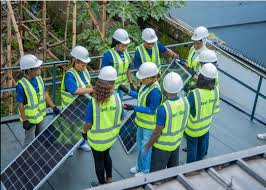Instollar Technologies has announced the second phase of its InstallHER Initiative, a clean energy training programme designed to increase the number of women participating in Nigeria’s growing solar energy sector. Backed by the Acumen Angels Grant, this phase of the initiative is currently training 100 women across the country to become certified solar technicians, sales agents, and entrepreneurs.
The initiative is part of Instollar’s broader goal of training 10,000 women by the year 2030. Speaking during the announcement, the Chief Executive Officer of Instollar Technologies, Chinwe Udo-Davis, highlighted the gender imbalance in the solar workforce and stressed the importance of bridging the gap.
“Out of over 1,200 technicians in our workforce database, less than one per cent were women. That’s a gap we can’t afford to ignore. InstallHER is our solution—a hands-on pathway for women to access the skills, opportunities, and income potential in Africa’s energy transition,” Udo-Davis said.
According to Udo-Davis, the InstallHER Initiative is focused on removing the barriers that prevent women from entering the solar industry. These barriers include the high cost and complexity of technical training, limited exposure to industry opportunities, and a lack of mentorship. He added that the programme not only trains women but also connects them directly to job opportunities in the clean energy sector.
The training curriculum includes practical modules on solar installation and maintenance, entrepreneurship, sales strategies, and business development. The programme also incorporates mentorship sessions and networking opportunities with established players in the solar and renewable energy industry.
The pilot phase of InstallHER, which took place in June 2024, trained over 30 women. Many of them have since secured placements with solar companies or taken up sales and installation roles within their communities. According to Udo-Davis, this impact demonstrates that the initiative is not only about skills acquisition but also about creating access to real income-generating opportunities.
“This isn’t just about training. It’s about connecting women to real income-generating opportunities in an industry that desperately needs talent,” he said.
Instollar Technologies operates a digital workforce platform that connects solar companies with trained gig workers across Africa. The company’s services include solar home systems, commercial and industrial installations, mini-grids, mesh grids, and comprehensive after-sales support. Through this platform, women trained under the InstallHER programme can be matched with companies seeking skilled labour, allowing them to gain practical experience and earn income.
As Nigeria continues to battle energy poverty and limited access to electricity in rural and semi-urban areas, clean energy solutions like solar are gaining ground. However, the renewable energy workforce remains male-dominated, leaving a huge gap in gender inclusion. Industry experts say that training more women will not only promote gender equity but also help scale the sector’s capacity to deliver on Nigeria’s energy transition goals.
Stakeholders in the renewable energy and gender advocacy space have commended Instollar’s efforts. They say the programme aligns with Nigeria’s national development goals, particularly in the areas of clean energy access, women empowerment, and sustainable economic development.
The company’s long-term plan to train 10,000 women by 2030 aligns with global Sustainable Development Goals, particularly SDG 5 (Gender Equality), SDG 7 (Affordable and Clean Energy), and SDG 8 (Decent Work and Economic Growth).
With increasing support from local and international partners, Instollar’s initiative is expected to serve as a model for other energy companies looking to integrate gender-inclusive practices into their operations. The company also plans to expand the InstallHER programme to other West African countries where it already has a presence.
Meanwhile, the firm is calling on policymakers, development organisations, and private sector players to support the initiative through funding, mentorship, and job placement partnerships. By creating an enabling environment for women in clean energy, stakeholders believe that Nigeria can not only address its electricity deficit but also unlock a massive pool of untapped talent.
